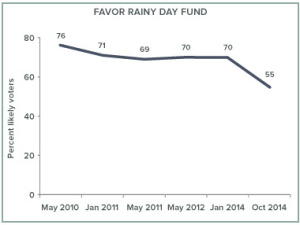One of the biggest surprises in the PPIC Statewide Surveys this fall has been the inability of Proposition 2 (aka the rainy day fund) to garner majority support from voters. The measure—which was placed on the November ballot by the governor and a unanimous vote of the legislature—allows for annual transfers of revenues into an account to be used only for fiscal emergencies and to pay off state debt.
Support did rise from 43 percent in our September poll to 49 percent in October. This may be a sign that Proposition 2 can defy the conventional political wisdom about ballot measures starting out with less than 50 percent support being doomed to fail. Certainly, its supporters find this trend encouraging. But, given the widespread support for the idea of a rainy day fund in earlier PPIC polls, why is Proposition 2 struggling to achieve majority support? Further analysis of our survey results offers a cautionary tale about the political pitfalls of fiscal reforms.
We have been tracking a wide array of fiscal reforms in our polls, including the idea of a rainy day fund: “Do you favor or oppose increasing the size of the state’s rainy day fund and requiring above-average revenues to be deposited into it for use during economic downturns?” In the five times this question was asked before Proposition 2 was put on the ballot, likely voter support hovered around 70 percent. Today, support for the rainy day fund idea has fallen to 55 percent among likely voters. This suggests a strong link between supporting the rainy day fund concept and voting yes on Proposition 2—in fact, 7 in 10 of those who would vote yes on Proposition 2 express support for a rainy day fund. More important, why has a fiscal reform that was consistently and highly regarded fallen out of favor with so many voters?
 We looked at the possibility that Californians are less inclined to support a rainy day fund because the state’s finances have been improving. But our tracking question on state budget perceptions found that slightly more likely voters say that the state budget situation is a big problem today (62%) than in January (56%). Moreover, those who see the state budget as a big problem are less likely to favor a rainy day fund today (48%) than they were in January (65%).
We looked at the possibility that Californians are less inclined to support a rainy day fund because the state’s finances have been improving. But our tracking question on state budget perceptions found that slightly more likely voters say that the state budget situation is a big problem today (62%) than in January (56%). Moreover, those who see the state budget as a big problem are less likely to favor a rainy day fund today (48%) than they were in January (65%).
The steep decline in support for a highly popular idea seems to have political overtones. Since January, support for the rainy day fund idea has dropped from a solid majority to below 50 percent among several groups: Republicans (72% January, 47% October), conservatives (69% January, 47% October), those who disapprove of the job performance of both the governor (65% January, 42% October) and the legislature (65% January, 47% October), and those who say the state is going in the wrong direction (67% January, 48% October). Meanwhile, Democratic governor Jerry Brown has been touting the virtues of Proposition 2 on the campaign trail, and Republican leaders who supported it have been silent.
In an election context, the rainy day fund idea has thus become politically polarizing. The governor’s success in rallying his supporters around Proposition 2 is reflected in its recent rise in the polls. But the rainy day fund idea has lost favor among Republicans and conservatives who used to be loyal supporters. Today, support for idea is much higher among Brown voters (68%) than Kashkari voters (43%). Governor Brown may need to do more to reassure the Democratic base of the long-term benefits of a rainy day fund to prevent Proposition 2 from falling short of majority support.
In short, a rainy day fund that once had strong backing across party lines has become a divisive idea. This is a reminder that even a seemingly uncontroversial issue with unanimous support in the legislature is subject to political redefinition in the heat of an election. Future tax and spending reforms may face an even more challenging path if they can’t ride on the coattails of an incumbent governor with a 54 percent approval rating and 52 percent supporting his reelection.
The lesson is that the popularity of any given reform can fade unless voters know that it is supported by leaders who share their partisan views and reflect their political values.

